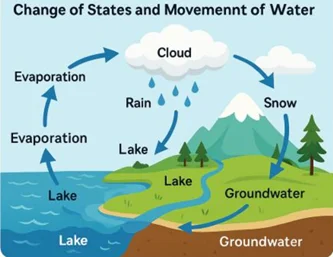Answer: I did well in understanding and labelling most parts of the water cycle.
I was able to correctly label Evaporation, Condensation, Rain, Cloud, River, Lake, and Ocean. 🌊☁️🌧️
These helped me understand how water changes its state and moves in nature.
However, I found it a bit unclear to show Groundwater and how snow forms on mountains during condensation. I’ll revise this part again for better understanding. ❄️💧

(Label the given parts of the Water Cycle diagram.)
📘 Diagram Labelling – The Water Cycle
Use the given words to label the diagram correctly:
➡️ Cloud
➡️ Evaporation (from Ocean, Lake, and River)
➡️ Condensation (formation of clouds)
➡️ Rain / Snow (precipitation)
➡️ River → Lake → Ocean (collection of water)
➡️ Groundwater (water stored under the Earth’s surface)
🌀 Process Summary:
The water from oceans, lakes, and rivers evaporates into the air as vapour. It condenses to form clouds and then returns as rain or snow. This water flows back into rivers and oceans, completing the water cycle. 🌧️🌊
💡 Did You Know?
Only about 1% of all water on Earth is freshwater that humans and animals can use — the rest is salt water or frozen! ❄️💦
